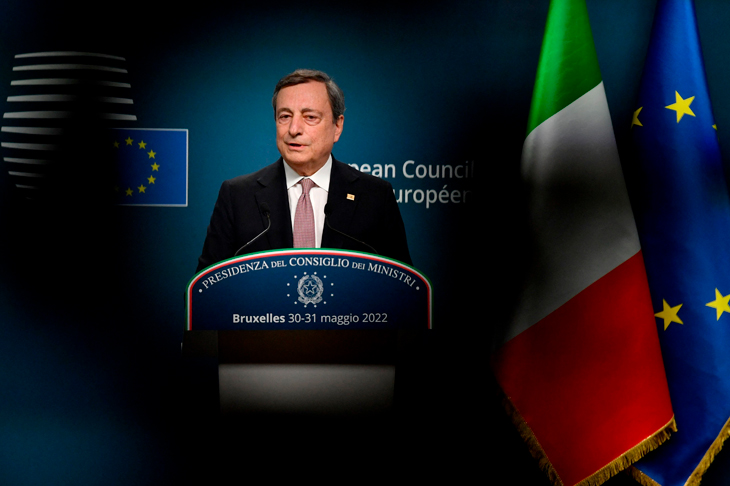Giuseppe Tomasi di Lampedusa’s novel Il Gattopardo (The Leopard), published posthumously, portrays the decadence of the Sicilian aristocracy at the time of the unification of the various states on the Italian peninsula into a single country (known in Italian as the Risorgimento), as embodied in the character of Don Fabrizio, Prince of Salina (called the ‘Leopard’ after his family crest). Considering the social and political upheaval of the period as a threat to his class’s supremacy, Don Fabrizio pretends to support the introduction of a new regime in order to preserve the privileged position of the aristocracy. As his nephew, Tancredi, tells him: Se vogliamo che tutto rimanga come è, bisogna che tutto cambi (‘If we want things to stay as they are, things will have to change’). Thus, changes are paradoxically implemented on the condition that everything remains exactly as it is, nothing must change. In other words, keeping power for power’s sake.
In his recent book Virus e Leviatano, the veteran Italian journalist Aldo Maria Valli pointedly employed the image of the leviathan, the Biblical sea monster, which symbolises a powerful and destructive enemy, to describe how the rule of law and constitutional guarantees in Italy were destroyed under the guise of ‘public health’. Italy, which had one of the strictest lockdowns, has a death rate per 100,000 which is far greater than Sweden’s, which did not lockdown.
Italy also imposed one of the most cruel vaccine passport regimes in the world, known as la Certificazione verde, or ‘Green Pass’. Not only were Italians who refused to have two doses plus the booster jab stripped of their right to move, work and participate in a great number of social activities, they were also forbidden from entering post offices to withdraw their pension, and were only allowed access to supermarkets to buy goods of primary necessity. What is more, Covid-19 vaccination was made compulsory for all Italians over 50, with fines for non-compliance. Roger L. Simon wrote earlier this year in the Epoch Times that the news from Italy sounded like good incipits for a dystopian fantasy novel or like a déjà vu recalling the Soviet Union. Most Green Pass requirements were removed as of the first of May.
The Italian government is headed by Prime Minister Mario Draghi, who is not even an elected politician. He was appointed prime minister by President Sergio Mattarella in February 2021 to head an ‘emergency government of national unity’ after Parliament had failed, as often happens, to find a prime minister from among its ranks. Draghi is a former president of the European Central Bank, ex-managing director of Goldman Sachs and chief inventor of ‘quantitative easing’ or Magic Money Theory. He is, therefore, the ultimate ‘Leopard’, which explains why his approach has been amongst the most brutal in the world – barring those of Daniel Andrews and Mark McGowan – against a virus of limited severity.
However, in April an important blow against the Covid leopard was made in Sicily. In an action brought by a nursing student who was unable to complete his internship due to refusing the Covid jab, the Court of Administrative Justice for the island-region handed down a decision declaring that mandatory vaccination may well be unconstitutional, and has referred the matter to the Constitutional Court in Rome for ultimate determination.
In its 53-page judgment, the Sicilian Court made some significant observations regarding Covid-19 vaccines and side effects, quoting directly from the European Union’s own database, Eudravigiliance.
The Court noted that, as at the end of January 2022, out of 570 million Pfizer doses given in the EU, 582,000 adverse effects were reported, 7,000 of which were fatal. As regards AstraZeneca, out of 69 million doses, 244,000 adverse events were reported, 1,447 of which were fatal. In relation to Moderna, out of 139 million doses administered, there were 150,000 adverse reactions, 834 of them fatal. As for Johnson & Johnson (Janssen), out of 19 million doses, 40,776 adverse reactions were reported, 279 of which resulted in death. The Court stated that, while the side effects in a significant number of cases were mild, there were also a number of cases in which they were enough to irreversibly compromise the health of the vaccinated person, including disability.
In terms of the constitutional question, Article 3 of the Italian Constitution guarantees equality before the law, without distinction of sex, race, language, religion, political opinion, personal and social conditions. Further, Article 32 provides that, while a law may be made in relation to compulsory medical treatment, such a law must not ‘violate the limits imposed by respect for the human person’. On this score, the Court noted, tellingly, that while the number of serious adverse events may be be a small portion, nevertheless, the constitutional criterion for compulsory medical treatments to be enforced is unlikely to include a quantitative evaluation. Thus, mandatory vaccination cannot be lawful if carried out via products whose effects on vaccinated people’s health exceeds the threshold of ‘normal tolerability’. This cannot include the risk of serious or fatal adverse effects, even if these are small in relation to the vaccinated population.
So, if there are only a few adverse events, one death could be enough to render mandatory vaccination unconstitutional in Italy, according to the Sicilian Court. In the Court’s opinion, even if one accepts the risk of rare fatal adverse effects, this would involve serious ethical implications, for example, who would be responsible for determining the number of ‘disposable’ citizens? Therefore, mandatory vaccination requirements, even if now removed, may well have been unlawful when implemented.
This judgment is a bombshell for the Italian Constitutional Court. The President of the Court (appointed by the Draghi government) is Giuliano Amato, the son of Sicilian parents and himself twice prime minister (once un-elected) and a co-drafter of the European Constitution.
The question thus is whether the Amato Court will make a political decision in line with its masters, or one according to the rule of law, and thus slay the Covid leopard. A decision on this critical case is expected in the northern autumn.
Got something to add? Join the discussion and comment below.
Get 10 issues for just $10
Subscribe to The Spectator Australia today for the next 10 magazine issues, plus full online access, for just $10.
You might disagree with half of it, but you’ll enjoy reading all of it. Try your first month for free, then just $2 a week for the remainder of your first year.














Comments
Don't miss out
Join the conversation with other Spectator Australia readers. Subscribe to leave a comment.
SUBSCRIBEAlready a subscriber? Log in